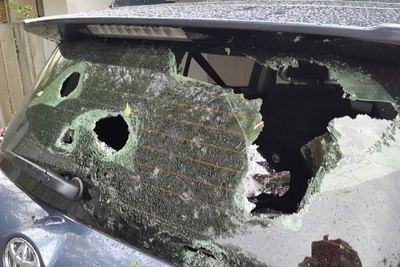One Hail of a Storm
For many Americans, especially in the Midwest and Great Plains states, the beginning of spring means preparing for hail storms with golf ball, and even softball sized pellets falling from the sky. According to Progressive Insurance's claims data, almost 60 percent of severe weather insurance claims in 2015 were attributed to hail! It's clear that hail is Mother Nature's most destructive weather system.
What's more, Progressive found spring is the most common time for hail claims, with 47 percent of hail claims occurring in April and June alone! May, however, was a close contender with more than 17 percent of hail claims. If you live in the Midwest or Great Plains states, hail can be a big problem year after year. The states with the most hail claims for auto, include:
* Texas
* Colorado
* Kansas
* Minnesota
* Missouri
According to Progressive, the majority of hail claims (36%) are due to golf ball sized pellets. Furthermore, April had the most large sized hail claims - think grapefruits and golf balls - out of any month!
To avoid damage from major storms this spring, Progressive is here to provide tips to protect your car from hail as you wait out the income storms.
* Get covered parking: Covered parking can save you a lot of hassle and money, especially in the middle of the country. Progressive has a map highlighting states that typically receive the most hail<http://at.progressive.com/everything-insurance/progressive-insurance-hail-claims-by-state-and-month>. If you live in one of the heavier hail states - known as the Hail Belt - you should evaluate your parking options.
* Ride out the hail storm: If you don't have access to covered parking, another option is to find temporary shelter. Local malls, for example, usually have parking garages where you could park if you know a storm is brewing. If you don't have a covered place to store your vehicle, find those options for the big storms.
* Use blankets or a hail car cover: If you don't have a shelter option, and you know a storm is coming, get something over your car. Some companies sell car covers specific to this purpose, but you can use your own blankets, as well. Just make sure you duct tape them down-the winds can pick up pretty quickly during hail storms. The tape can leave a sticky residue on your car, but most likely won't cause any damage to the paint. Prepare in advance for this. Opt for personal safety and don't do this if the storm is happening within a matter of minutes.
* Watch Mother Nature: During prime hail season, be sure to keep an eye on the weather forecast in your area. If you know a storm is brewing, you'll give yourself more time to get prepared and put your hail protection plan into action.
* Consider RV insurance, too: While many Americans only think of hail damaging their car, we have seen a large amount of hail claims involving RVs, as well. If you have an RV in your driveway, you may want to consider expanding your coverage beyond the standard auto insurance. Bundling your auto and RV insurance through Progressive not only increases your coverage but gives you more discounts and flexibility when big life events hit.
* Get Comprehensive and Rental coverage: With insurance, "Comprehensive" doesn't mean "all encompassing." Instead, it's the specific coverage that helps pay for damage caused by things like weather or fire. In most cases, Comprehensive will cover hail damage, too. Also, make sure you have Rental coverage-one in 10 Progressive policyholders who have a total loss (meaning their car is damaged beyond repair) do. And it's an option that helps pay for a rental car if your car is being fixed or replaced. Both Comprehensive and Rental are among the personalized coverages<http://www.progressive.com/auto/personalized-insurance-coverages/> you can add to your Progressive Auto policy.
Remember, if a storm does rolls in and your property is damaged, your insurance company is here to help! Once it's safe, inspect your property and call your insurance company to file a claim or ask any questions you might have in the process.
For more insights from Progressive and an infographic that details this information visit http://lifelanes.progressive.com/2015-hail-stats/.



